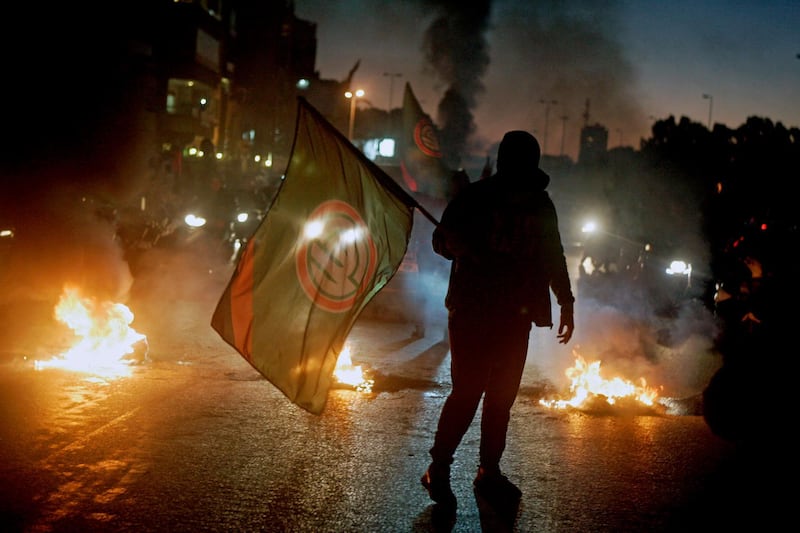Lebanon's President Michel Aoun on Tuesday called on leaders to protect the country's fragile government and security after a political row triggered street protests.
Supporters of parliament speaker Nabih Berri, a long time adversary of Mr Aoun, set tyres on fire and blocked roads on Monday. That came after the president's son-in-law, Foreign Minister Gebran Bassil, called Mr Berri "a thug".
In one incident, gunfire erupted near offices of Mr Aoun's Free Patriotic Movement (FPM) east of Beirut.
The tension threatens to destabilise an already shaky government ahead of elections in May.
Supporters of Mr Berri were expected to demonstrate for a second day even after Mr Bassil publicly apologised in a newspaper for the insult he made.
Local media quoted sources close to the speaker as saying that he had threatened to pull out members of his Amal Movement from the cabinet of Mr Aoun.
The president, a former army general during Lebanon's civil war, is the founder of the FPM, the political party Mr Bassil leads.
Like many of the country's most prominent politicians, Mr Berri and Mr Aoun were leaders during the war (1975-1990), and their animus dates to that period.
The current episode is linked to a row over the promotion of about 200 army officers. Mr Berri has complained because the vast majority of those picked for promotion are Christian and because Mr Aoun did not seek the approval of the finance minister, who is a member of Amal. Many of the officers also served under Mr Aoun when he was in the army.
The president urged a truce. "What happened on the ground is a big mistake based on a mistake," he said in a statement. "I forgive all those who assaulted me and my family, and I look to those who insulted each other to forgive each other."
_______________
Read more:
Comment: In Lebanon, the military sends out an aggressive message about censorship
US stresses Lebanon must cut Hizbollah from financial system
_______________
The Amal Movement is a Shiite political party whose militia was aligned with the Syrian government, while Mr Aoun’s forces battled that government before the Syrians forced him into exile in the late 1980s after a brief stint as president. Mr Aoun did not return to Lebanon until 2005, when Syrian troops withdrew from the country.
Though they have occasionally functioned as political allies, Mr Aoun and Mr Berri have a long history of personal antagonism, partly over allegations of corruption made by the president and Mr Bassil against Mr Berri.
Mr Berri did not support Mr Aoun’s election to the post of president in 2016, an event that ended nearly two years in which Lebanon did not have a formal government. Mr Aoun’s appointment cleared the way for the election of current prime minister Saad Hariri, who has presided over a consensus government.
The Al Akhbar newspaper quoted sources close to Mr Berri accusing Mr Bassil of insulting Mr Berri in a calculated attempt to create chaos ahead of the parliamentary elections on May 6.
Representatives of Mr Berri and the foreign ministry declined to comment when contacted by The National.
Soldiers were deployed because of the protests which had prevented Mr Berri’s supporters from reaching his party's office. It was unclear which side might have fired shots.
Mr Hariri said on Monday he may meet with Mr Berri.
"I do not think there is wisdom in the matter but in any case, there is a political dispute, and I will work to reach a compromise," the prime minister said, adding that there were more important issues the country should be focused on.
“The Lebanese citizen wants to remove waste, get electricity and find jobs. This is what he cares about,” Mr Hariri said. “I believe that calmness is the only way and hopefully next week we will witness a solution.”
Hezbollah, which is allied with Amal, has so far only gone as far as releasing a brief statement calling for restraint, saying such language "creates more crises, separates the ranks and renders people apart."





